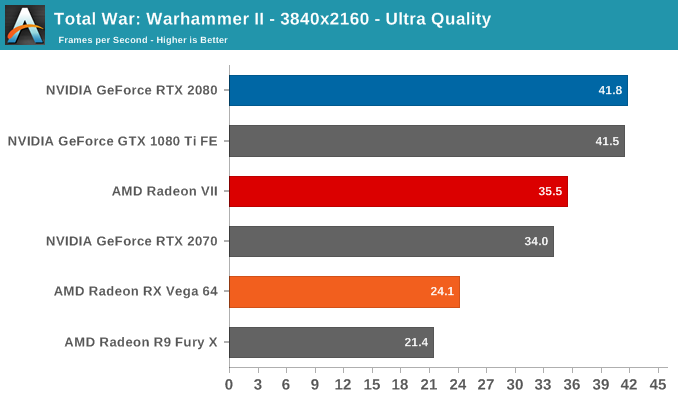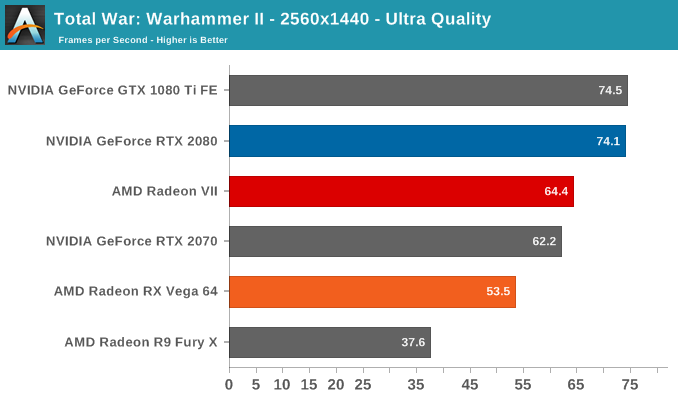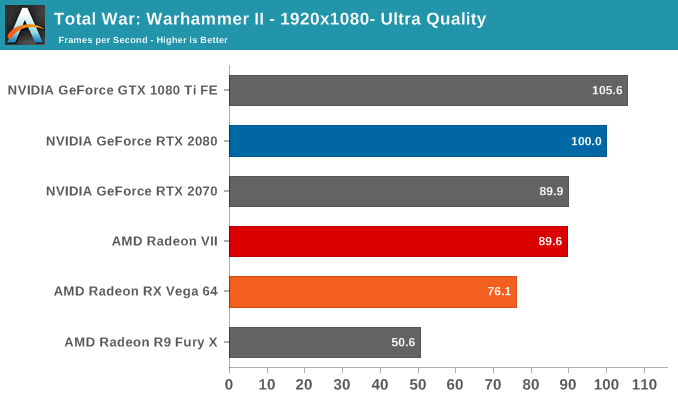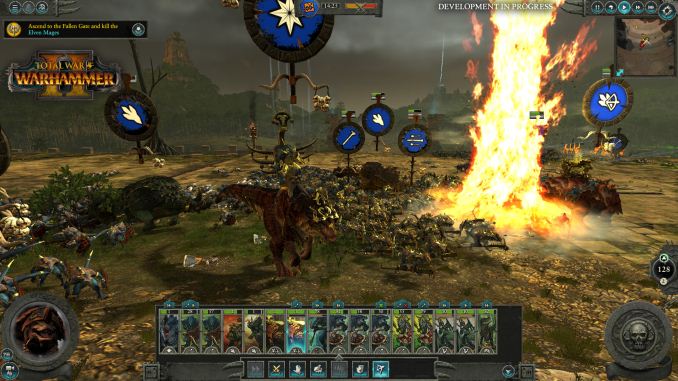The AMD Radeon VII Review: An Unexpected Shot At The High-End
by Nate Oh on February 7, 2019 9:00 AM ESTTotal War: Warhammer II (DX11)
Last in our 2018 game suite is Total War: Warhammer II, built on the same engine of Total War: Warhammer. While there is a more recent Total War title, Total War Saga: Thrones of Britannia, that game was built on the 32-bit version of the engine. The first TW: Warhammer was a DX11 game was to some extent developed with DX12 in mind, with preview builds showcasing DX12 performance. In Warhammer II, the matter, however, appears to have been dropped, with DX12 mode still marked as beta, but also featuring performance regression for both vendors.
It's unfortunate because Creative Assembly themselves have acknowledged the CPU-bound nature of their games, and with re-use of game engines as spin-offs, DX12 optimization would have continued to provide benefits, especially if the future of graphics in RTS-type games will lean towards low-level APIs.
There are now three benchmarks with varying graphics and processor loads; we've opted for the Battle benchmark, which appears to be the most graphics-bound.



Wrapping things up for games is Total War: Warhammer II, and this title is one that is less than ideal for the matchup between the Radeon VII and its competitors. Much like GTA V, the card is able to make substantial improvements over its predecessor; at 4K, this is an astounding 47% increase over the RX Vega 64. Nevertheless, given the starting point of the RX Vega 64, the Radeon VII is still somewhere around 15% behind the reference RTX 2080, meaning that it performs a shade faster than the reference RTX 2070 at 4K/1440p. That's not where the Radeon VII ideally wants to be, despite being respectable way to iterate on the RX Vega 64.











289 Comments
View All Comments
mapesdhs - Friday, February 8, 2019 - link
It's going to be hillariously funny if Ryzen 3000 series reverses this accepted norm. :)mkaibear - Saturday, February 9, 2019 - link
I'd not be surprised - given anandtech's love for AMD (take a look at the "best gaming CPUs" article released today...)Not really "hilariously funny", though. More "logical and methodical"
thesavvymage - Thursday, February 7, 2019 - link
It's not like itll perform any better though... Intel still has generally better gaming performance. There's no reason to artificially hamstring the card, as it introduces a CPU bottleneckbrokerdavelhr - Thursday, February 7, 2019 - link
Once again - in gaming for the most part....try again with other apps and their is a marked difference. Many of which are in AMD's favor. try again.....jordanclock - Thursday, February 7, 2019 - link
In every scenario that is worth testing a VIDEO CARD, Intel CPUs offer the best performance.ballsystemlord - Thursday, February 7, 2019 - link
There choice of processor is kind of strange. An 8-core Intel on *plain* 14nm, now 2! years old, with rather low clocks at 4.3Ghz, is not ideal for a gaming setup. I would have used a 9900K or 2700X personally[1].For a content creator I'd be using a Threadripper or similar.
Re-testing would be an undertaking for AT though. Probably too much to ask. Maybe next time they'll choose some saner processor.
[1] 9900K is 4.7Ghz all cores. The 2700X runs at 4.0Ghz turbo, so you'd loose frequency, but then you could use faster RAM.
For citations see:
https://www.intel.com/content/www/us/en/products/p...
https://images.anandtech.com/doci/12625/2nd%20Gen%...
https://images.anandtech.com/doci/13400/9thGenTurb...
ToTTenTranz - Thursday, February 7, 2019 - link
Page 3 table:- The MI50 uses a Vega 20, not a Vega 10.
Ryan Smith - Thursday, February 7, 2019 - link
Thanks!FreckledTrout - Thursday, February 7, 2019 - link
I wonder why this card absolutely dominates in the "LuxMark 3.1 - LuxBall and Hotel" HDR test? Its pulling in numbers 1.7x higher than the RTX 2080 on that test. That's a funky outlier.Targon - Thursday, February 7, 2019 - link
How much video memory is used? That is the key. Since many games and benchmarks are set up to test with a fairly low amount of video memory being needed(so those 3GB 1050 cards can run the test), what happens when you try to load 10-15GB into video memory for rendering? Cards with 8GB and under(the majority) will suddenly look a lot slower in comparison.